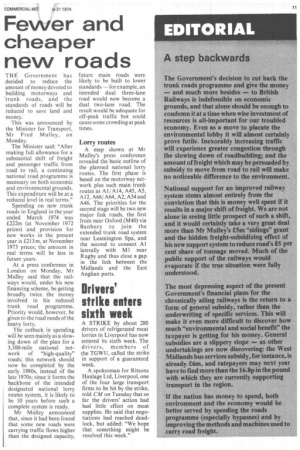A step ba ckwards
Page 13

If you've noticed an error in this article please click here to report it so we can fix it.
'he Government's decision to cut back the trunk roads programme and give the money, and much more besides — to British Railways is indefensible on economic grounds, and that alone should be enough to condemn it at a time when wise investment of resources is all-important for our troubled economy. Even as a move to placate the environmental lobby it will almost certainly, prove futile. Inexorably increasing traffic will experience greater congestion through the slowing down of roaclbuilding; and the amount of freight which may he persuaded by subsidy to move from road to rail will make no noticeable difference to the environment.
National support for an improved railway system stems almost entirely from the conviction that this is money well spent if it results in a major shift of freight. We are not alone in seeing little prospect of such a shift, and it would certainly take a Very great deal more than Mr Mulley's f5ni "sidings" grant and the hidden freight-subsidizing effect of his new support system to reduce road's 85 per cent share of tonnage moved. Much of the public support of the railways would evaporate if the true situation were fully understood.
The most depressing aspect of the present Government's financial plans for the chronically ailing railways is the return to form of general subsidy, rather than the underwriting of specific services. This will make it even more difficult to discover how much "environmental and social benefit" the a payer is getting for his money. General subsidies are a slippery slope — as other undertakings are now discovering: the West Midlands bus services subsidy, for instance, is already £6m, and ratepayers may next year have to find more than the 16.8p in the pound with which they are currently supporting transport in the region.
a
if the nation has money to spend, both environment and the economy would be better served by speeding the roads programme (especially bypasses) and by improving the methods and machines used to carry road freight.








































































































